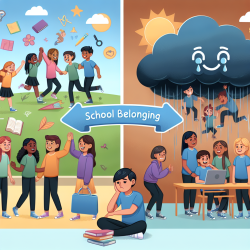Enhancing School Belonging to Mitigate Bullying Effects
Bullying is a pervasive issue in schools, impacting not only the victims but also those who witness it. Recent research published in the International Journal of Environmental Research and Public Health explores the critical role of a sense of school belonging in mediating the relationship between witnessing bullying and internalizing symptoms such as anxiety and depression. This blog will delve into the findings and implications of this study, providing practitioners with insights to improve their interventions.
The Role of School Belonging
The study conducted by Doumas and Midgett (2024) highlights that a sense of school belonging significantly influences the mental health outcomes of students who witness bullying. The research involved middle school students and used structural equation modeling to establish that witnessing bullying diminishes a student's sense of belonging, which subsequently increases internalizing symptoms.
In both studies conducted, results consistently showed that students who witnessed bullying reported a lower sense of school belonging. This diminished sense of belonging was directly linked to higher levels of internalizing symptoms, including depression and anxiety.
Implications for Practitioners
For practitioners working in schools, these findings underscore the importance of fostering a strong sense of school belonging to mitigate the negative effects of bullying. Here are some actionable strategies:
- Implement Bystander Training: Equip students with the skills to intervene in bullying situations. Research indicates that students who are trained to act as positive bystanders report an increased sense of belonging and reduced internalizing symptoms.
- Promote Anti-Bullying Norms: Establish a school culture where bullying is unacceptable. This can be achieved through school-wide campaigns and by modeling positive behaviors.
- Enhance Teacher Support: Train teachers to recognize and support students who witness bullying. Teachers can play a pivotal role in fostering a supportive school environment.
Future Research Directions
While the study provides valuable insights, further research is necessary to explore additional factors that may influence the relationship between witnessing bullying and internalizing symptoms. Future studies could consider larger sample sizes and diverse geographical locations to enhance the generalizability of the findings. Additionally, examining the role of defending behavior and school climate as potential moderators could provide a more comprehensive understanding.
Conclusion
Understanding the mediating role of school belonging in the context of bullying is crucial for developing effective prevention and intervention strategies. By focusing on enhancing school belonging, practitioners can help reduce the mental health risks associated with witnessing bullying. For more detailed insights, practitioners are encouraged to explore the original research.
To read the original research paper, please follow this link: Sense of School Belonging as a Mediator of the Relationship between Witnessing Bullying and Internalizing Symptoms.










